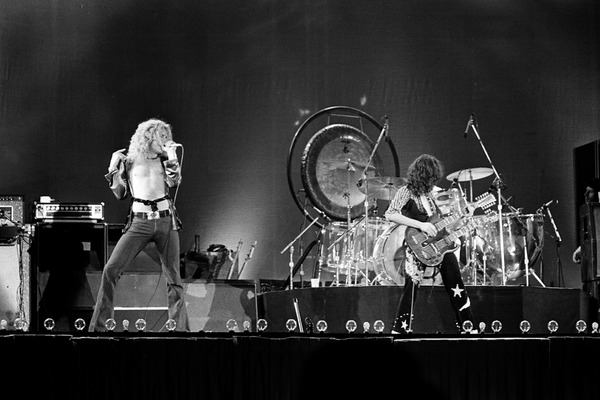
![]()
Led Zeppelin were never a band of the singles charts.
Their final single, "Fool in the Rain," released in December 1979, arrived hot on the heels of the immense popularity of In Through the Out Door, which had hit shelves just a month prior. Remarkably, it was only the tenth single the band issued across their eight studio albums. This was the last gasp of their studio output before John Bonham's tragic death in 1980 brought the Zeppelin era to a close.
"I always thought of the Stones as a pop group who made singles," Robert Plant mused in 2005. "The whole idea of what we did competing with Bobby Goldsboro as they were wasn't where we were at. What we said was there's no point of putting out a single when the album is the statement of the band."
In Through the Out Door saw a notable change in the band's creative process, with Plant and John Paul Jones stepping into more prominent roles in the songwriting. Jones, in particular, was invigorated by the Yamaha GX-1 synthesizer, a new addition to his musical arsenal.
"Jonesy didn't contribute much to the songwriting on [1976's] Presence, and that made things tough," Jimmy Page reflected in Light and Shade: Conversations with Jimmy Page. "But he bought a new synthesizer [a Yamaha GX-1], and it inspired him to come up with a bunch of things for In Through the Out Door. He also started working closely with Robert, which was something that hadn't happened before"
One standout from the album was the unconventional "Fool in the Rain." The song, with its melancholic piano refrain and a playful samba interlude replete with whistles and timpani, bore an influence from an unlikely source—the 1978 FIFA World Cup in Argentina.
"But with the World Cup in Argentina in '78 and a lot of this kind of South American thing going around, and it being every time you watched any soccer on television, it was always a South American kind of rhythm thing going along. It's not an attempt to be Carlos Santana or anything like that. It's kind of a little bit diversified and straightforward, you know."
Despite its divergence from Zeppelin's typical sound, "Fool in the Rain" succeeded, climbing to No. 21 on the charts by February 1980. Not that the band paid much attention. "Chart music tends to be a little disposable," Page remarked. "We just really wanted to write really good music that would hold up on its own."
For Page and Bonham, however, In Through the Out Door represented a detour from the hard-rocking essence of Led Zeppelin. "Bonzo and I had already started discussing plans for a hard-driving rock album after that. We both felt In Through the Out Door was a little soft."
In the end, "Fool in the Rain" serves as a bittersweet epilogue—a glimpse of a band willing to experiment, even as the end of their journey loomed near.